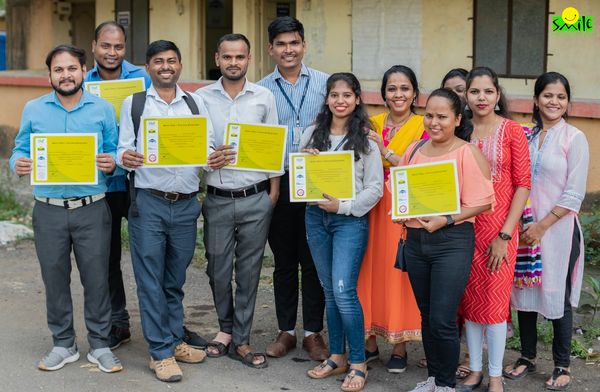Before heading into the topic of recent trends in CSR in India 2024, let’s under the visible impact of Corporate Social Responsibility (CSR) in the lives of those who need it.
“The true test of a company’s commitment to CSR is when times are tough, not when they’re good.”
Steve Rochlin
During the COVID-19 pandemic, many companies including nonprofits faced unprecedented challenges. However, many stepped up to support their communities and employees. One great example is Pepsico Foundation, the philanthropic arm of Pepsico, an American multinational food, snack, and beverage corporation. In partnership with Smile Foundation, they provided over 50,000 PPE kits, along with digital thermometers, thermal scanners, oximeters, concentrators & more than 1 lakh N95 masks, across 11 Indian states to support the administration in its fight against the pandemic.
Corporate social responsibility (CSR) departments have endured a lot during the last few years. Every CSR team is likely juggling a whole lot of things together— social justice movements, geopolitical turmoil, and also the need to connect the employees and the communities, meet board expectations and adapt their strategies to a fast-paced and uncertain economy.
So what do CSR trends 2024 look like? How should the sector get ready for a world economy traversing inflation, stock market crashes, wars, and more? Some of the recent CSR trends in India and the world overall are listed below:
Trend 1: How to Safeguard Your Social Impact Programs During the Recession with CSR
The anticipated recession is the fundamental background for 2024. Since many businesses are working in anticipation of a slowing economy, the temptation to reduce their corporate giving may materialise.
CSR will be put to the test in 2024, according to the leaders at the Association of Corporate Citizenship Professionals (ACCP), Points of Light, and Chief Executives for Corporate Purpose (CECP). They contend that because it can both boost your company’s performance in the short term and enhance connections with stakeholders over the long term, corporate social impact is even more crucial during recessions.
Cutting ties to the community may make it less likely that consumers will want to support your business because customers, investors, and employees all consider corporate purposes when making decisions.
Corporate volunteering and benchmarking are just a few of the strategies to increase your influence when you’re on a tight budget. The causes most important to your stakeholders should be the focus of your team’s efforts after you have clarified your social impact plan.
Trend 2: Despite Criticism, linking ESG to Business Success
Environment, Social, and Governance (ESG) has emerged as a hot topic outside of the corporate citizenship industry. ESG has progressed beyond risk reduction to profit creation for businesses globally. Enhancing confidence with stakeholders while improving the quality of lives of the marginalised globally, seems like something everyone benefits from.
Trend 3: Prioritise Results Over Proxy Metrics
With corporate philanthropy, results clearly matter. It’s challenging to support your work without understanding your actual results, whether you’re changing systems policies or offering direct relief programmes.
In a recent study on policies in food security, nutrition researchers and activists emphasised the value of outcomes. They said that by emphasising quantity over quality, food security programmes frequently neglect nutrition. So, rather than filling people up with empty calories, a move from “food security” to “nutrition security” will increase health, inclusion, and general well-being.
Qualitative parameters are going to matter as much as the quantitative reach of the CSR associations.
Trend 4: Demands for Impact Data are Increasing as Public Interest Grows
Never before have corporate social impact teams’ efforts been so widely observed. More data requests, questions, and speaking requests have been made of CSR experts than ever before, ranging from reports for their ESG department to speeches outlining how their programmes would improve society by 2030.
Because of this drive for transparency, CSR teams will require precise impact data to show their leadership, board, and other stakeholders the success of their programmes. Executives in the field anticipate that they will want impact data this year to “justify or secure their funds.”
Trend 6: Giving Underrepresented Communities Chances
Businesses are collaborating with nonprofits like us, Smile Foundation to use a variety of strategies to give disadvantaged communities access to opportunities. Opportunities with the potential of holistically changing their lives. Out of the recent trends in CSR in India
Among the tactics are— expanding the amount of shelf space available for goods produced by minority-owned companies, giving minority business owners access to investment capital and mentoring minority youth. Other examples are employing candidates with years of gaps in their resumes, awarding DEI grants, and conducting customer-facing fundraising campaigns.
Trend 7: The Value of Taking a Position in Business Social Activism
Stakeholders look to companies to speak out and act in times of global crises. Companies may have been under pressure to react or face backlash as a result of corporate positions and public reactions to the Russia-Ukraine War and the Roe v. Wade(abortion) ruling by the US Supreme Court.
Several businesses are attempting to create a framework to address societal challenges. Your response may be influenced by the questions you pose regarding the incident, like “Do we have a stake in this issue?”, “Can we really make a difference in this situation?”, “Does this have a direct impact on our stakeholders and customers?”
Corporate Philanthropy Value in 2024
Between 2020-21, COVID-19 tested everyone’s resilience. Through 2022, social justice increased as a result of the catastrophes that the pandemic brought into everyone’s lives. In 2023, the effects of conflict and geopolitical upheaval were felt all over the world. In 2024, everyone is thinking about the economy, from the boardrooms to the grocery stores. There has been a paradigm shift in corporate social responsibility trends.
CSR is crucial to ensuring the survival of a company and society when a recession is a possibility. By financial assistance, volunteers, in-kind gifts, and advocacy, businesses may aid nonprofits while also strengthening their relationships with their stakeholders and positioning themselves to continuously thrive and be genuine changemakers.
Do you intend to change your CSR plan this year? Become a part of the recent CSR trends in CSR in India. Contact us at Smile Foundation for a CSR partnership and we will be glad to guide you through the process. Let’s build a better world for our kids and the marginalised!




